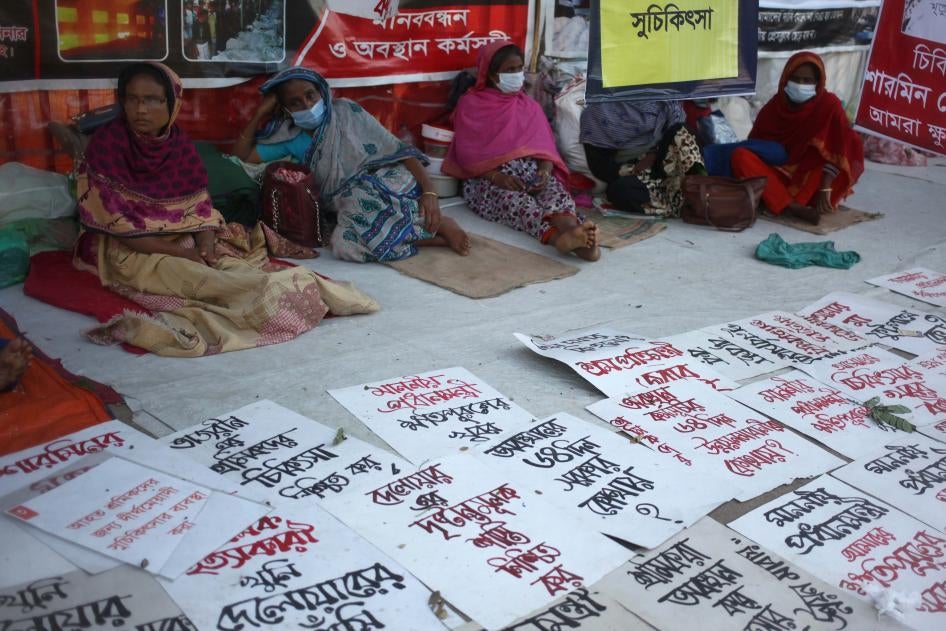(Brussels) – European Union member states should reject efforts to weaken a proposed EU directive mandating corporations to respect human rights and the environment, Human Rights Watch said in a letter to the Council of the European Union. Council members are expected to finalize their position on the proposed EU Corporate Sustainability Due Diligence directive by December 1, 2022.
Proposals aimed at narrowing the scope of the directive or limiting civil liability, including one from Germany, would significantly weaken the proposed directive.
Companies across the value chain should be brought within the directive’s purview.
“Efforts to narrow the scope of the directive and limit the ability of victims of corporate abuses to approach national courts in Europe favor corporations rather than protect people who have been harmed,” said Aruna Kashyap, associate director for corporate accountability at Human Rights Watch. “The council should reject these efforts and send a strong message that the EU is going to stand with victims of corporate abuses, rather than against them.”
The German government’s proposed amendment would undermine the directive’s goal of holding companies liable in courts, leaving many victims of human rights abuses in global value chains without legal recourse, Human Rights Watch said.
Human Rights Watch has seen the German government’s proposal, which was circulated among council members in late October, but not made public. It seeks to restrict civil liability only to cases in which companies “intentionally or negligently” fail to comply with certain obligations under the proposed EU directive. Civil liability is an important avenue for victims of corporate abuses who have experienced human rights and environmental harm to seek justice in national courts in Europe.
November 24 is the tenth anniversary of the Tazreen factory fire in Bangladesh, which killed over 100 garment workers. Germany’s proposal to weaken civil liability would make it much harder for victims of corporate abuses, such as the Tazreen fire, to bring civil claims in national courts of EU member states. Its recommendations aim at creating a “safe harbor” for companies, giving them more room to evade liability.
In addition, in cases in which companies are “certified” under “approved” certification schemes or are a part of “approved” “industry or sector initiatives,” Germany has recommended limiting civil claims even more narrowly to cases of “intent and gross negligence” on the part of companies.
Instead of making it difficult for victims, the directive should put the onus on companies to prove they conducted human rights and environmental due diligence. Moreover, the directive should not allow companies to plead due diligence defenses to evade all liability for harm that results in deaths, permanent disability, or irreparable or intergenerational harm.
Some industry groups have pressed to provide immunity for liability if they are certified, but that would contradict the German government’s governing coalition’s stated commitment to an “effective” law at the EU. Providing companies with immunity for liability merely because they are certified or are part of industry or sector initiatives exempts them from objective scrutiny by courts, leaving it to the companies themselves and to the sector initiatives they join, or certifiers they hire, to decide whether they followed the law.
Social audits and certification programs have proliferated over the last few decades following public pressure on companies to demonstrate that they are adhering to international human rights and environmental standards. Some result in labels attached to products signaling that the product has met their standards. It’s difficult to determine exactly how many, but one source, the Ecolabel Index, lists in its searchable database 456 “ecolabels” that carry a sign or logo indicating an “environmentally preferable product, service or company.”
Policymakers and ethical consumers should be aware that certification has not been a panacea for human rights or environmental harm. Letting companies evade liability merely because they are certified is a costly error that risks people’s lives and the environment, Human Rights Watch said.
Certification schemes depend on privatized inspections, known as social audits. Human Rights Watch research has revealed they can contain serious flaws. Typically, audits are conducted over just a few days, without enough time for auditors to interview workers off-site in safe locations, follow leads, and corroborate information. Audits conducted over a few days are at greater risk of leaving abuses undetected, especially child labor, forced labor, harassment, and discrimination.
The scope of audits is heavily influenced by big corporations or their suppliers who finance them. Companies can choose “friendly” auditors who indicate they are willing to be more lenient or turn a blind eye to human rights abuses. Some suppliers being audited “prepare” for these audits by hiring consultants to create fake records and coach workers and managers to “pass” and be certified. The risk of such deception increases when auditors announce their arrival in advance.
The audit and certification industry has remained largely opaque. The underlying private inspection reports, on which the certifications are based, are rarely published, leaving everyone guessing about why or how a company was certified, and underscoring why such certification should not be used as a basis for limiting liability.
Hundreds of people have died in preventable disasters that serve as tragic reminders that social audits and certifications are not enough. The 2012 Ali Enterprises factory fire in Pakistan, the 2012 Tazreen factory fire in Bangladesh, the 2013 Rana Plaza building collapse in Bangladesh, and the 2019 Brumadinho dam collapse are among the most devastating tragedies involving sites that were audited or certified. A Brazil Congress enquiry into the dam collapse found that the mining company had pressured third-party auditors to falsely certify that the dam was safe. Social audits and certifications cannot be seen as a shortcut for a series of measures companies should take to prevent and respond to such disasters.
“The German government’s proposal is an insult to victims who have suffered because of companies,” Kashyap said. “Germany should become a champion for human rights by advocating for a law that allows victims of corporate abuses to seek legal redress.”







